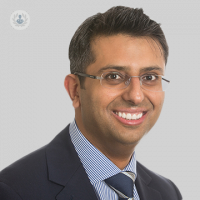What are the advantages of an intracapsular tonsillectomy?
Escrito por:When it comes to removing the tonsils, most of us are unaware that there is more than one option. Expert ENT surgeon Mr Sam Khemani is here to explain the pros and cons of intracapsular tonsillectomy and how it differs from the traditional extracapsular procedure.

What is the difference between intracapsular and extracapsular tonsillectomy?
The tonsil capsule is a thin fibrous partition between the tonsil and the underlying muscles of the throat. An extracapsular tonsillectomy involves complete removal of the tonsils and results in exposure of the muscle bed and the blood vessels that lie within the muscle. An intracapsular tonsillectomy involves removal of tonsil tissue up to, but not through the capsule. In the UK, most surgeons performing intracapsular surgery will aim to remove all of the visible tonsil tissue (more than 95%). There are different ways to perform an intracapsular tonsillectomy, but one of the most popular techniques is to use Coblation®. Coblation® uses a special plasma derived from saline which breaks down tissue at reasonably low temperatures, resulting in less pain and discomfort than some other techniques.
What are the advantages of an intracapsular tonsillectomy? (Recovery time, complications avoided)?
Intracapsular tonsillectomy has been pioneered for use in children and is mainly used for large tonsils causing obstruction (obstructive sleep apnoea). There is also now increasing evidence for it to also be offered to children suffering with recurrent tonsillitis. Intracapsular surgery has the advantage of reduced risks of bleeding as well as a much speedier recovery. One of the major downsides of conventional extracapsular surgery is the risk of bleeding after the operation (most commonly between after 3 to 7 days) with rates quoted between 2 and 5%. With intracapsular techniques the risk of bleeding is thought to be as low as 0.2%. Most children who have an intracapsular operation can return to school or nursery within a week whereas those that undergo extracapsular procedures will need 14 days off school.
Are there any disadvantages of an intracapsular tonsillectomy?
There is a small risk of tonsil regrowth over time using the intracapsular technique and an even smaller risk of this tissue causing similar problems in the future. In practice, this is reasonably rare. In the largest study of intracapsular surgery, 1,000 children were followed up after the procedure for more than a year and the chance of revision surgery was found to be about 2%. This occurred more frequently in children who were very small (less than 15kgs in weight) at the time of their surgery. The possibility of revision surgery is more than offset by the reduction in complications, including life-threatening bleeding, when compared with conventional extracapsular procedures.
Which patients would the procedure be most suitable for?
Intracapsular surgery is generally offered to children, as the benefits are very clear. Children presenting with very big tonsils and or adenoids are ideal candidates for an intracapsular procedure. A number of surgeons experienced in intracapsular techniques also offer this form of surgery to children with recurrent tonsillitis. Surgery needs to be more meticulous in these cases to avoid the possibility of ongoing symptoms and it is advisable to discuss the type of surgery in detail with your child’s surgeon in advance of any procedure.
Some surgeons with good experience of intracapsular techniques also offer this form of surgery to adults, but at the moment there is a lack of widespread evidence to understand the long-term outcomes. Early suggestions are that this is a useful technique in adults, but the benefits of reduced bleeding and faster recovery may not be quite as obvious as in children. If you are considering a tonsillectomy as an adult, you should ask your surgeon of their personal experience of intracapsular surgery.
How widely available is the procedure in the UK? (Do you expect it to become more widespread?)
Intracapsular tonsillectomy, particularly with Coblation®, is becoming much more widespread within the UK. Many of the major paediatric hospitals in the UK are already using this as their main surgical technique. As more and more evidence is released about the benefits of the procedure, it is likely that more surgeons will offer it.
Mr Khemani is a member of the faculty involved in training surgeons in the UK and Europe on performing Coblation intracapsular tonsillectomy.
Visit Mr Khemani’s Top Doctors profile to book an appointment!


